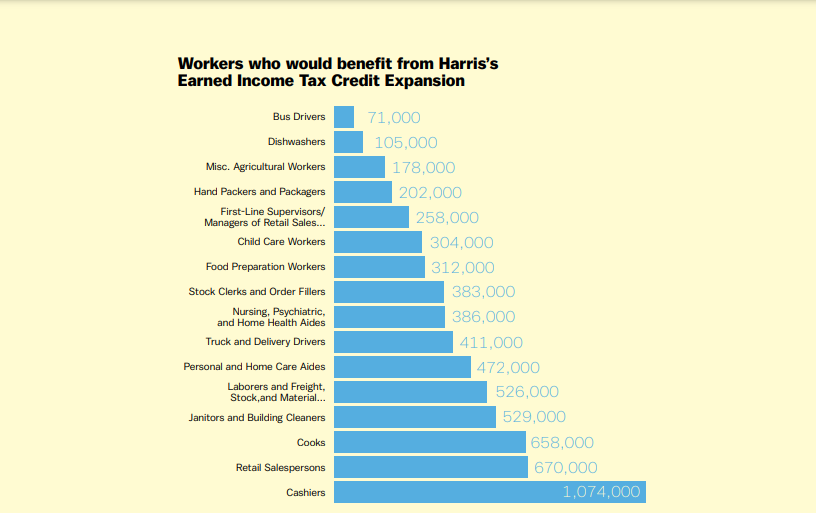The Democratic Party’s candidate for the U.S. presidential elections coming up early next month, Kamala Harris, has largely maintained a low profile when it comes to discussing the crypto industry. Her broader policy platform, the “Opportunity Economy,” noticeably avoided direct mention of digital assets.
However, at a fundraiser in New York City on September 22, Harris gave a rare glimpse into her thoughts on emerging technologies, including cryptocurrency. She expressed support for innovations like artificial intelligence (AI) and digital assets, emphasizing her commitment to modernizing the economy while ensuring consumer and investor protections.
“We will partner together to invest in America’s competitiveness, to invest in America’s future. We will encourage innovative technologies like AI and digital assets while protecting our consumers and investors,”
she declared.
However, this public endorsement left much to interpretation, offering little clarity on how crypto regulation might unfold under a Harris administration.
Some industry advocates have suggested that Harris’s economic plans could create a more favourable environment for crypto compared to the current cautious stance under President Biden. Brian Nelson, a senior campaign adviser, has hinted that she may be more open to pro-crypto policies if elected. Coinbase’s policy chief, Faryar Shirzad, responded to Harris’s comments by saying, “This is an important and constructive statement from Kamala Harris.” While noting that her position isn’t as bold as Donald Trump’s, he acknowledged that Harris’s recognition of digital asset innovation is significant, especially since she equated it with AI’s importance.
Others, like Boris Bohrer-Bilowitzki, the lead of Concordium, a Layer-1 blockchain, believe that Harris’s connections with figures like David Plouffe, a former Binance adviser, and Gene Sperling, a former Ripple Labs board member, are encouraging signs for the crypto sector. “They’re crypto experts,” Bohrer-Bilowitzki noted, expressing optimism about the VP’s potential stance on cryptocurrencies.
How Harris’s ‘Opportunity Economy’ Could Benefit the Crypto Industry
In August 2024, Kamala Harris introduced her vision for an “Opportunity Economy” and followed up with a broader policy statement in September. The proposal highlighted a focus on a strong rule of law and economic growth, with promises to enhance social mobility by prioritizing tax credits, education reform, and small business growth.
A key component of this plan is fostering regulatory clarity, a move that could benefit the crypto industry. Harris’s background as a former District Attorney suggests that her administration could prioritize creating a robust regulatory framework, ensuring that innovative technologies like blockchain and cryptocurrencies can thrive within well-defined legal boundaries.
Kristin Smith, CEO of the Blockchain Association, expressed optimism about this aspect of Harris’s plan. She reportedly stated that it could provide a “fresh opportunity” for the crypto sector to engage with Democrats and address concerns about inconsistent or unclear laws. A stable regulatory environment, Smith argued, would foster greater trust in digital assets and boost interest in the U.S. crypto market.
Another notable initiative in Harris’s plan is a $50,000 startup credit aimed at empowering small businesses. This could significantly benefit blockchain entrepreneurs by providing critical funding for startups that often struggle to secure traditional financing due to regulatory uncertainties. The credit could serve as a lifeline for emerging companies in the decentralized technology space.
My opportunity economy plan offers:
—Tax cuts for 100 million Americans
—$25,000 tax credit for first-time homebuyers
—$50,000 deduction to start a new business— Kamala Harris (@KamalaHarris) October 4, 2024
The “Opportunity Economy” also places emphasis on strengthening the middle class by expanding access to technical education and job training, as well as enhancing earned income tax credits for workers. This focus on skills development is crucial for the growth of the digital asset and blockchain industries, as a skilled workforce is essential for developing blockchain technologies, cybersecurity measures, and smart contracts.

Essentially, Harris’s policies could drive progress in the crypto space and other emerging technologies if they can successfully create an environment where these companies can compete and thrive.
Skepticism Surrounding Kamala Harris’s Crypto Policy Shift
Despite her recent public endorsement of digital assets, Harris’s newfound enthusiasm for the crypto sector has sparked skepticism. For years, she remained largely silent on the topic, with her first major statement on cryptocurrency emerging only in September 2024.
The timing of this endorsement raises questions. Harris’s previous reluctance to engage with the crypto industry has led some to believe that her recent statements are more of a strategic move to appeal to a crypto-savvy electorate rather than a genuine policy shift. This is particularly evident in the context of Donald Trump’s active courtship of the crypto community, which has placed pressure on Harris to adopt a more favourable stance.
Harris’s past as California’s Attorney General further complicates her narrative on crypto. During her tenure, she enforced stringent regulations on consumer protection and environmental policy, leading to concerns that her administration might impose tougher rules on the crypto industry.
BTC Inc. founder David Bailey has been particularly vocal in his criticism, accusing Harris of undermining the crypto industry by imprisoning developers and driving innovation out of the U.S. Others, like Jake Chervinsky, the legal chief at crypto venture firm Variant, expressed caution, stating that terms like “protecting consumers and investors” could be a smoke screen for policies that could harm the industry.
What Happens Next?
Ultimately, we’ll have to wait and see what Kamala Harris will actually do regarding cryptocurrency if she wins the election. While she has made some encouraging remarks, her statements lack the boldness and clarity seen in Donald Trump’s pro-crypto platform. Given the unpredictability of political promises and the general fickleness of politicians, it’s difficult to predict exactly how her administration would approach the crypto sector.
A Harris presidency could usher in a more balanced approach, prioritizing innovation while safeguarding public interest. On the other hand, a loss in the election could lead to a different, potentially more crypto-friendly administration. Either way, the U.S. crypto industry stands at a critical juncture—one that could either serve as a launchpad for growth or push the sector to the fringes, with the global crypto market moving forward regardless of the outcome.
Disclaimer: This article is intended solely for informational purposes and should not be considered trading or investment advice. Nothing herein should be construed as financial, legal, or tax advice. Trading or investing in cryptocurrencies carries a considerable risk of financial loss. Always conduct due diligence.
If you would like to read more market analyses like this, visit DeFi Planet and follow us on Twitter, LinkedIn, Facebook, Instagram, and CoinMarketCap Community.
Take control of your crypto portfolio with MARKETS PRO, DeFi Planet’s suite of analytics tools.”




















